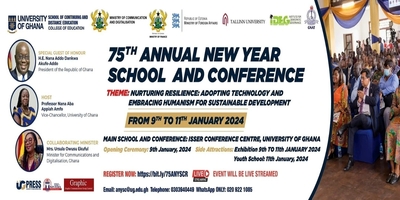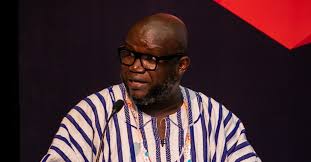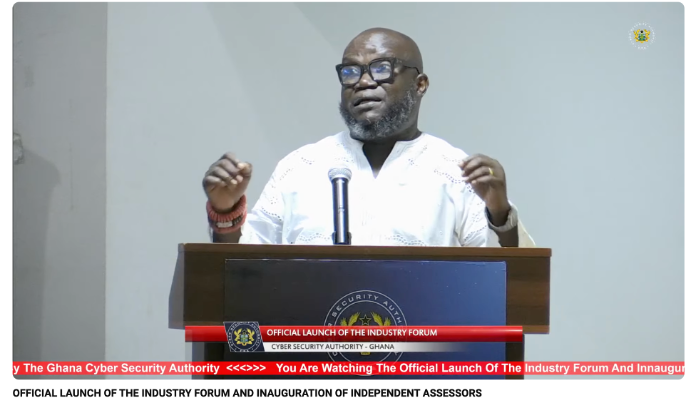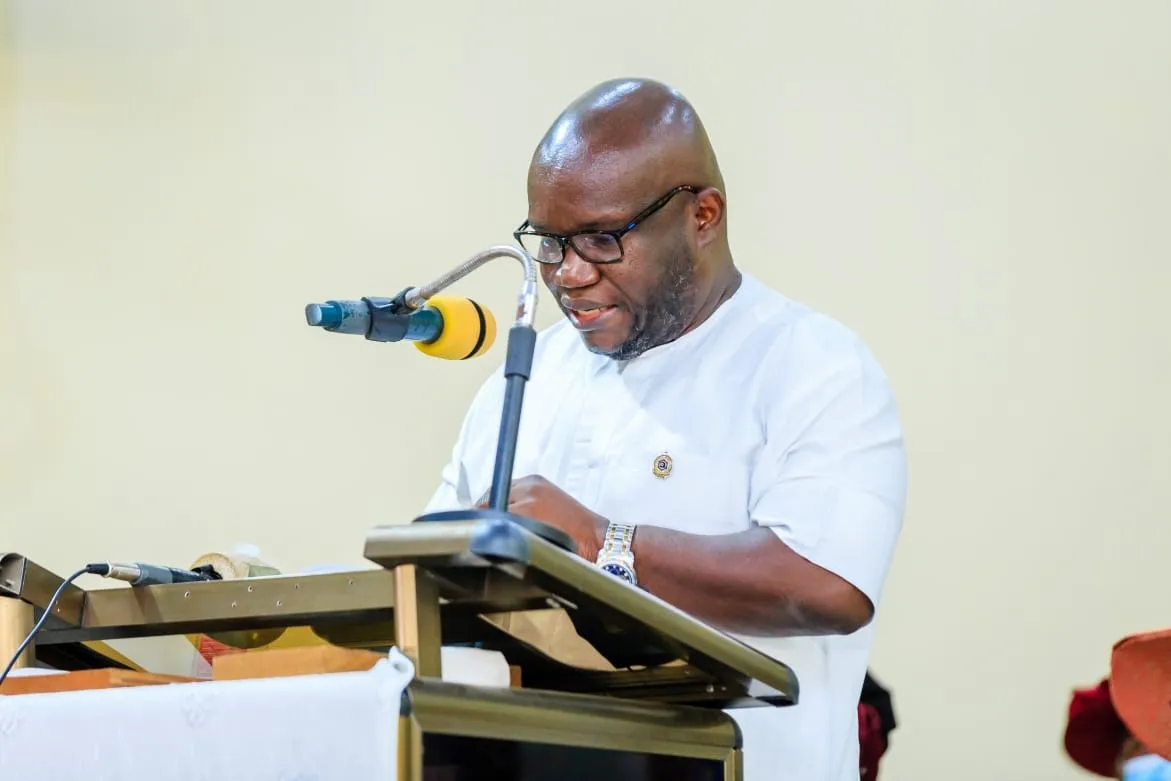Nurturing Resilience and Leveraging on Telecommunication Technology to Achieve Sustainable Growth
My short statement at the 75th Annual New Year School and Conference Conference. The theme for the conference is Nurturing Resilience: Adopting Technology and Embracing Humanism for Sustainable Development.
I am honoured to have the opportunity to speak before you today on the topic of nurturing resilience and leveraging telecommunication technology to achieve sustainable growth in Ghana and Africa. In a rapidly changing world, resilience is a critical factor for success. It is the ability to adapt, to bounce back from adversity, and to thrive in the face of challenges and adversity.
How are we bouncing back from the COVID-19 crisis, the Russian-Ukraine War, and our recent financial crisis? I posit that our financial challenges are more our doing collectively as a people than can be attributed to exogenous factors. So together, we can fix it.
In Africa, where the potential for growth and development is vast, resilience is especially important. Telecommunication technology plays a significant role in facilitating this growth by providing crucial infrastructure for communication, information access, and economic development.
With the rapid advancements in telecommunications and other technologies, including 5G, AI, AR, Big Data, and other disruptive technologies, Africa has the opportunity to leapfrog traditional development paths and accelerate progress towards sustainable growth.
However, if we do not take advantage of the 5th Industrial Revolution that is currently taking place around us, by changing our policy paradigm to a digital-by-default model, guaranteeing true regulatory independence, and transparency in our policy formulation, ensure that we move from being just consumers of technology to curators, then the gap would even widen.
We need to have a major change in our mindset about how we create and deploy technology. We should take this away from the NPP-NDC construct that we currently have, which has been the reason for our failings (note: I do not say failure; we are not done yet). We should not see this e-governance as just a procurement opportunity for corruption. We need to get academia, the private sector, and the citizenry involved in crafting the policies and being integral to the implementation.
Our leadership construct has to change from unbridled partisanship to an inclusive one based on meritocracy. The self-hatred of the Ghanaian of everything Ghanaian has to change. We need to be patriotic in our technological pursuit and ensure that the Ghanaian and the African is central to what we do.
It is the reason why this annual New School’s place in our governance construct should be elevated. It should be one of the crucibles in which we find Ghanaian solutions to our challenges minted by an inclusive amalgam of Ghanaian intelligentsia, practitioners, and thinkers. Recommendations from these fora should feature centrally in our national development plan. We should move away from these short-term manifestoes that just focus on the next election to a technologically driven development plan that focuses on the next generation.
One of the key ways in which telecommunication technology can help nurture resilience and achieve sustainable growth is through the transformation of our agriculture and improved access to education and information.
Our agriculture will have to be transformed into AgriTech, taking our context of low productivity and a large labour force to deploy technology to transform and empower the Ghanaian farmer and everyone within the value chain. It should aid us in empowering our real sector and change the paradigm of referring to that that employs over 80%[1] of our population, derogatorily as the informal sector. By using technology, we should transform their work within our context. Yes, that transformation of our productivity should be more than super-exponential.
That informal sector tag should change; it is the failure of you and I to be able to design and implement systems that consider our context, that has left us in this current situation. We should learn from how mobile money did not change the way we live our lives but has transformed a significant part of the real sector. It was driven by telecommunication; with the right policies and partnerships between regulators, policymakers, academia, and the private sector, we can do it.
If you do not remember anything I have said at all, please leave here with the mindset that we would not call our micro, small, & medium-sized sectors informal again, but the real sector, and work to transform it. Let’s move away from Local-Content, to Ghana-Content. The way we call things affects the way we see them and the way we value them.
So, telecommunication technology can drive innovation and entrepreneurship, creating new opportunities for economic growth. With access to reliable internet connectivity and mobile communication services, entrepreneurs, micro, and small businesses can reach wider markets, access financial services, and collaborate with partners and customers across the globe.
This has the potential to create more resilient and diverse economic ecosystems that can withstand economic shocks and thrive in the face of adversity. We need to work together to bridge the telecommunication usage gap in Ghana of over 60%. This would require a multistakeholder approach to policy, regulation, and practice that would ensure that we do not have a situation where, though we have telecommunication coverage of over 90%, about 60% of Ghanaians under at least 3G coverage do not access and use mobile internet.
By leveraging telecommunication infrastructure, more people in Ghana and across Africa can access quality education, learn new skills, and stay informed about global trends and opportunities. This enables individuals and businesses to adapt to changing market demands and contribute to the growth of their communities and the continent as a whole. We have not taken advantage of the opportunities that COVID gave us, all the acceleration in EduTech seems to be rolling back after the lockdown. That cannot be; we need to leverage technology to ensure that we democratize access to education.
Additionally, telecommunication technology can help improve healthcare systems and access to vital medical services, especially in remote and underserved areas. Through telemedicine and mobile health initiatives, healthcare professionals can reach patients in need, provide remote consultations, and deliver essential medical care. This not only enhances resilience in healthcare systems but also contributes to overall societal well-being and productivity.
However, while telecommunication technology offers immense potential for growth, it is essential to ensure that its benefits are inclusive and accessible to all segments of society. Efforts must be made to bridge the digital divide, empower marginalized communities, and ensure that telecommunication infrastructure reaches even the most remote areas. By doing so, we can create a more resilient and equitable society where everyone has the opportunity to thrive and contribute to sustainable growth.
In conclusion, nurturing resilience and leveraging telecommunication technology is crucial for achieving sustainable growth in Ghana and Africa. By harnessing the power of telecommunication infrastructure, we can empower individuals and communities, drive economic development, and build a more resilient future for our continent. Let us work together, government, academia, industry, and citizens—to embrace the opportunities presented by telecommunication technology and use them to create a brighter and more prosperous future for all.
Thank you.
God bless our homeland, Ghana, and make it great, strong, and resilient based on a digital-by-default mindset and an e-governance system.
[1] Statista – Economic contribution of Small and Medium-sized Enterprises (SMEs) in Ghana as of 2023, by category – https://www.statista.com/statistics/1322256/economic-contribution-of-smes-in-ghana-by-category/#:~:text=Small%20and%20Medium%2Dsized%20Enterprises,percent%20of%20the%20country’s%20GDP.
This post has already been read 568 times!








Post Comment